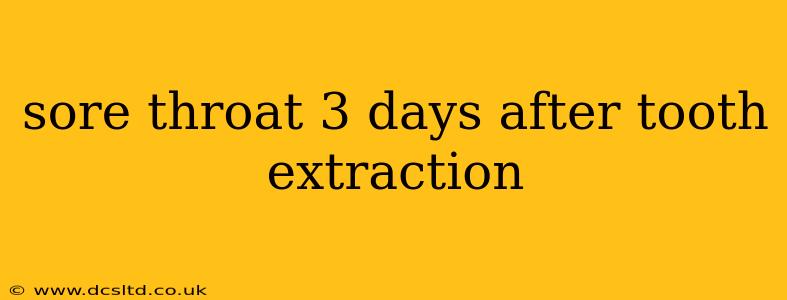Experiencing a sore throat three days after a tooth extraction can be unsettling. While some post-extraction discomfort is expected, a sore throat might indicate a separate issue or a complication from the procedure. This comprehensive guide explores potential causes, when to seek professional help, and effective home remedies to alleviate your discomfort.
Is a Sore Throat Normal After Tooth Extraction?
A slight scratchiness or dryness in the throat in the days following a tooth extraction isn't entirely uncommon. This can be attributed to the general stress on the body from the procedure, possible mouth breathing during recovery (especially if you've been instructed to avoid rinsing vigorously), or even the anesthetic lingering. However, a significant sore throat, especially accompanied by other symptoms, warrants attention. It's crucial to distinguish between mild discomfort and a genuine problem.
What Could Be Causing My Sore Throat After Tooth Extraction?
Several factors can contribute to a sore throat after tooth extraction. Let's examine some key possibilities:
1. Irritation from Dry Mouth
Post-extraction, you might be instructed to avoid rinsing vigorously or using mouthwash, which can unintentionally lead to dry mouth. Dry mouth, in turn, can irritate the throat, causing a feeling of scratchiness and discomfort.
2. Infection (Dry Socket or Other)
A serious concern is infection. A dry socket (alveolar osteitis), where the blood clot dislodges from the extraction site, is a painful complication that can lead to a sore throat. Other infections, potentially originating from bacteria in the mouth, can also manifest as a sore throat. Symptoms like increased pain, swelling, bad breath, and fever alongside the sore throat are strong indicators of infection.
3. Post-Nasal Drip
Sometimes, a seemingly unrelated issue like post-nasal drip can cause throat irritation. If your sinuses are congested or producing excessive mucus, this drainage can irritate your throat and feel like a sore throat unrelated to the extraction site.
4. Viral or Bacterial Infection
It's entirely possible to develop a completely separate viral or bacterial throat infection concurrently with your tooth extraction. These aren't directly linked but can occur simultaneously.
5. Reaction to Anesthesia
While rare, a reaction to the anesthetic used during the procedure could lead to throat irritation or swelling. This is usually noticeable much sooner after the extraction than three days post-op, but it's important to consider all possibilities.
When Should I See a Dentist or Doctor?
Don't hesitate to contact your dentist or doctor if your sore throat:
- Is accompanied by fever, chills, or significant swelling.
- Is severe and doesn't improve after a few days of home care.
- Is accompanied by difficulty swallowing or breathing.
- Is accompanied by a foul taste or odor in your mouth.
- Is accompanied by pus or other discharge from the extraction site.
Home Remedies for a Sore Throat After Tooth Extraction
While these remedies can help alleviate discomfort, they are not a replacement for professional medical advice. Always consult your dentist or doctor if your symptoms are severe or worsening.
- Rest: Ample rest allows your body to heal and fight off any potential infections.
- Hydration: Drink plenty of water or clear fluids to keep your throat moist.
- Warm Salt Water Gargles: Gently gargling with warm salt water can help soothe a sore throat and reduce inflammation. Avoid vigorous rinsing near the extraction site, as instructed by your dentist.
- Honey and Lemon Tea: The soothing properties of honey and lemon can ease throat irritation.
- Over-the-counter pain relievers: Acetaminophen (Tylenol) or ibuprofen (Advil, Motrin) can help manage pain and reduce inflammation, as directed by your doctor or dentist. Avoid aspirin, as it can increase bleeding risk.
Disclaimer: This information is for general knowledge and does not constitute medical advice. Always consult a healthcare professional for any health concerns or before making any decisions related to your health or treatment.
